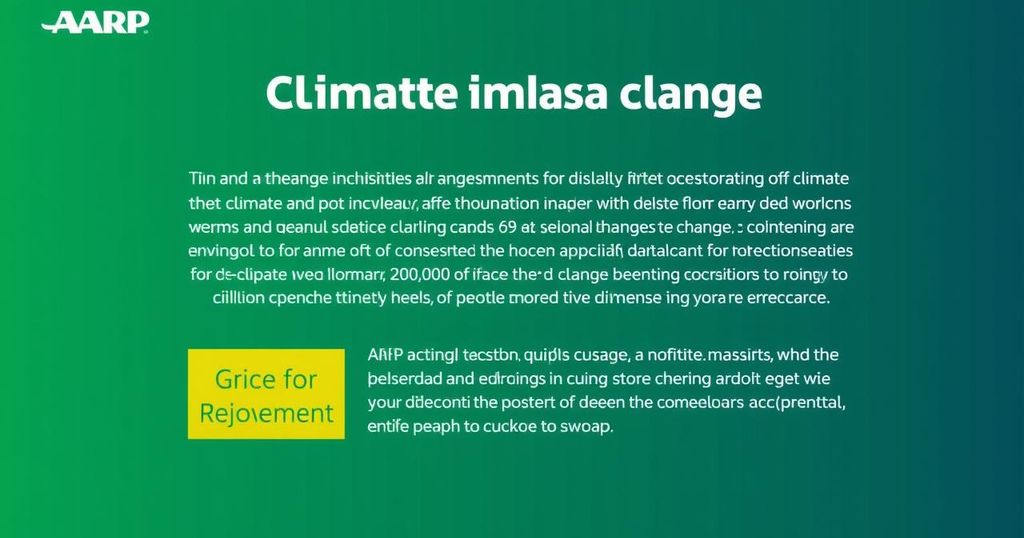Is AARP Failing to Address Climate Change Effectively?

The AARP faces criticism from its members, led by Robert Loeb, regarding its lack of strong advocacy for climate change action. A recent petition with over 8,000 signatures calls for the organization to adopt a more urgent position that aligns with its mission of protecting older Americans from the harmful impacts of climate change. While they have historically focused on social issues like healthcare and retirement security, there are growing calls for AARP to integrate environmental concerns into their advocacy efforts, especially as extreme weather increasingly jeopardizes the health and well-being of vulnerable older populations.
The discussion surrounding the American Association of Retired Persons (AARP) and its level of engagement in climate change advocacy arises from concerns among its members regarding the increasingly detrimental impacts of climate change on older adults. Founded by Robert Loeb and a coalition of concerned AARP members, a petition campaign has emerged requesting that AARP adopt a more assertive approach to climate action. Activists assert that climate change poses significant threats to the health, financial stability, and living conditions of seniors, which aligns with AARP’s mission to protect these interests. Historically, AARP has taken stands on various social issues, yet recent policy revisions appear to reflect a retreat from stronger climate-related assertions made in their 2020-2021 policy book. The current policy document contains statements on climate change but lacks the urgency or explicit actionable measures seen previously. It emphasizes the contributions of climate change to exacerbated health risks among older populations but falls short of suggesting concrete solutions or policies. Despite their broad representation of individuals over 50 years old, AARP tends to prioritize issues like retirement security, savings, and consumer rights over urgent climate concerns. Members argue that extreme weather events disproportionately affect seniors, particularly those in vulnerable socioeconomic positions. AARP’s hesitance to take a firmer stance may stem from the constraints of being a nonprofit organization, which prevents it from partaking in direct political lobbying. As the climate crisis intensifies and the negative consequences for older adults become increasingly apparent, there is a growing expectation among members that AARP transform its approach. Some even suggest framing climate efforts as consumer advocacy, emphasizing cost-saving benefits and the promotion of sustainable practices. The petition, which has gained over 8,000 signatures across 46 states, calls for AARP to engage in a considerable climate mobilization during the current presidential term. While AARP continues to play a vital role in supporting Social Security and Medicare, critics highlight a potential reluctance to challenge conservative allies by adopting a more robust position on climate change. Ultimately, the evolving landscape of climate-related issues necessitates a reevaluation of AARP’s priorities and actions in order to better serve and protect the older adult population.
The American Association of Retired Persons (AARP) is a well-established nonprofit organization representing older Americans, focusing on issues that directly affect their well-being while traditionally engaging in advocacy regarding social security and health care. As climate change poses a critical threat to public health, particularly among older adults, there is a growing discourse regarding AARP’s response to these environmental challenges. A diverse coalition of AARP members is advocating for a stronger stance on climate action, lamenting perceived dilution in the organization’s current policies compared to prior positions. This development reflects heightened awareness of the disproportionate impact of climate change on older individuals, especially those with pre-existing health conditions, low incomes, or who reside in areas frequently affected by natural disasters.
In summary, while AARP has championed numerous vital policies for older Americans, there is a pressing need for the organization to intensify its focus on climate change—a challenge increasingly recognized as a serious threat to the health and security of its members. The current petition campaign signifies a collective demand from its members for a proactive approach to climate action, particularly in fostering a dialogue on the interconnectedness of consumer advocacy and environmental sustainability. As the stakes of climate change escalate, AARP’s strategic choices in this domain will be crucial in shaping its future relevance and effectiveness as an advocate for older individuals.
Original Source: www.nextavenue.org






